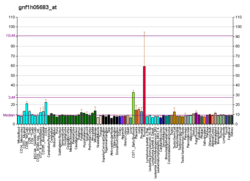ZFYVE1
Zinc finger FYVE domain-containing protein 1 is a protein that in humans is encoded by the ZFYVE1 gene.[5][6][7]
The FYVE domain mediates the recruitment of proteins involved in membrane trafficking and cell signaling to phosphatidylinositol 3-phosphate (PtdIns(3)P)-containing membranes. This gene encodes a protein which contains two zinc-binding FYVE domains in tandem. This protein displays a predominantly Golgi, endoplasmic reticulum and vesicular distribution. Alternatively spliced transcript variants have been found for this gene, and they encode two isoforms with different sizes.[7]
References
- 1 2 3 GRCh38: Ensembl release 89: ENSG00000165861 - Ensembl, May 2017
- 1 2 3 GRCm38: Ensembl release 89: ENSMUSG00000042628 - Ensembl, May 2017
- ↑ "Human PubMed Reference:".
- ↑ "Mouse PubMed Reference:".
- ↑ Derubeis AR, Young MF, Jia L, Robey PG, Fisher LW (Nov 2000). "Double FYVE-containing protein 1 (DFCP1): isolation, cloning and characterization of a novel FYVE finger protein from a human bone marrow cDNA library". Gene. 255 (2): 195–203. PMID 11024279. doi:10.1016/S0378-1119(00)00303-6.
- ↑ Cheung PC, Trinkle-Mulcahy L, Cohen P, Lucocq JM (Mar 2001). "Characterization of a novel phosphatidylinositol 3-phosphate-binding protein containing two FYVE fingers in tandem that is targeted to the Golgi". Biochem J. 355 (Pt 1): 113–21. PMC 1221718
 . PMID 11256955. doi:10.1042/0264-6021:3550113.
. PMID 11256955. doi:10.1042/0264-6021:3550113. - 1 2 "Entrez Gene: ZFYVE1 zinc finger, FYVE domain containing 1".
Further reading
- Nagase T, Kikuno R, Nakayama M, et al. (2001). "Prediction of the coding sequences of unidentified human genes. XVIII. The complete sequences of 100 new cDNA clones from brain which code for large proteins in vitro.". DNA Res. 7 (4): 273–81. PMID 10997877. doi:10.1093/dnares/7.4.271.
- Ridley SH, Ktistakis N, Davidson K, et al. (2002). "FENS-1 and DFCP1 are FYVE domain-containing proteins with distinct functions in the endosomal and Golgi compartments.". J. Cell. Sci. 114 (Pt 22): 3991–4000. PMID 11739631.
- Krugmann S, Anderson KE, Ridley SH, et al. (2002). "Identification of ARAP3, a novel PI3K effector regulating both Arf and Rho GTPases, by selective capture on phosphoinositide affinity matrices.". Mol. Cell. 9 (1): 95–108. PMID 11804589. doi:10.1016/S1097-2765(02)00434-3.
- Strausberg RL, Feingold EA, Grouse LH, et al. (2003). "Generation and initial analysis of more than 15,000 full-length human and mouse cDNA sequences.". Proc. Natl. Acad. Sci. U.S.A. 99 (26): 16899–903. PMC 139241
 . PMID 12477932. doi:10.1073/pnas.242603899.
. PMID 12477932. doi:10.1073/pnas.242603899. - Heilig R, Eckenberg R, Petit JL, et al. (2003). "The DNA sequence and analysis of human chromosome 14.". Nature. 421 (6923): 601–7. PMID 12508121. doi:10.1038/nature01348.
- Ota T, Suzuki Y, Nishikawa T, et al. (2004). "Complete sequencing and characterization of 21,243 full-length human cDNAs.". Nat. Genet. 36 (1): 40–5. PMID 14702039. doi:10.1038/ng1285.
- Gerhard DS, Wagner L, Feingold EA, et al. (2004). "The status, quality, and expansion of the NIH full-length cDNA project: the Mammalian Gene Collection (MGC).". Genome Res. 14 (10B): 2121–7. PMC 528928
 . PMID 15489334. doi:10.1101/gr.2596504.
. PMID 15489334. doi:10.1101/gr.2596504. - Wan D, Gong Y, Qin W, et al. (2004). "Large-scale cDNA transfection screening for genes related to cancer development and progression.". Proc. Natl. Acad. Sci. U.S.A. 101 (44): 15724–9. PMC 524842
 . PMID 15498874. doi:10.1073/pnas.0404089101.
. PMID 15498874. doi:10.1073/pnas.0404089101.
This article is issued from
Wikipedia.
The text is licensed under Creative Commons - Attribution - Sharealike.
Additional terms may apply for the media files.




